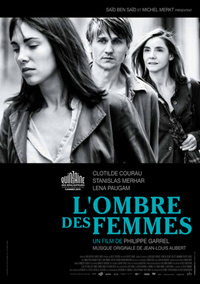Masculine/Feminine: Garrel Offers Yet Another Take On A Romantic Rift
 As we see with many so-called auteurs, Philippe Garrel has been making the same film over and again throughout his entire career. In addition to his mastery of tone and a bold willingness to scrape the sewers of the most despairing regions of his ego, the secret to his work’s sustainability has laid in the subtle variations on his signature themes, which give depth and even warmth to otherwise arguably cliched takes on male/female power dynamics. In the Shadow of Women, then, represents a reduction of the intimate concerns that have preoccupied his last few films to an essential state. This yielded a lighter than usual black romantic comedy, but one that carries forward the Late Garrel optimism that was signaled in Jealousy (2013)–ironic, since these films were both motivated by the deaths of his father and mother.
As we see with many so-called auteurs, Philippe Garrel has been making the same film over and again throughout his entire career. In addition to his mastery of tone and a bold willingness to scrape the sewers of the most despairing regions of his ego, the secret to his work’s sustainability has laid in the subtle variations on his signature themes, which give depth and even warmth to otherwise arguably cliched takes on male/female power dynamics. In the Shadow of Women, then, represents a reduction of the intimate concerns that have preoccupied his last few films to an essential state. This yielded a lighter than usual black romantic comedy, but one that carries forward the Late Garrel optimism that was signaled in Jealousy (2013)–ironic, since these films were both motivated by the deaths of his father and mother.
Pierre (Stanislas Merhar) is married to Manon (Clotilde Courau), and the two work on films together–he as the director, her, in his “shadow,” the editor, camera operator, etc. (Their latest documentary shoot includes an interview with a purported Resistance Fighter talking about his experience warring against Nazis.) Pierre meets Elizabeth (Lena Paugam) while she wheeling a stack of 35mm canisters to her car, and the two quickly begin to have an affair. Moral judgements against Pierre, and therefore masculinity in general ensue, only to shift when it turns out Manon isn’t entirely innocent either.
Beautifully photographed by master Swiss DP Renato Berta in shimmery, silvered black-and-white photography, the image is strikingly gothic whenever a scene takes place indoors. This quality is no doubt also attributable to Merhar’s droll, even vampiric performance in the lead. His body, as if stricken with rigor mortis, barely seems to exist among the living–especially so when he is in the company of a woman. “You suck the life from me,” he tells Elizabeth during an argument, as if the fangs of love renders any (or as Garrel might believe, every) man into an undead corpse. Indeed, this could well be deemed Garrel’s “vampire movie”; Pierre, fired up by love in one late moment, even excitedly goes for the neck of one lover before apologizing goofily.
Humor is not a new element in Garrel’s sensibility, but many will be surprised how light and winking some of this film’s more frank moments are. Garrel, long interested in Freudian psychoanalysis as a major source of inspiration, has spoken of humor as a release for the audience upon our recognition of a truth that we’ve long repressed from our consciousness. Specious as this might be, In the Shadow of Women does feel like a device for Garrel’s own exorcism of the undesirable impulses he attributes as an intrinsic trait of masculinity. “Don’t blame me for being a man,” says Merhar–that is, Pierre; that is, Garrel, certainly with a grin on his face.
Reviewed on May 15th at the 2015 Cannes Film Festival – Directors’ Fortnight – 73 mins.
★★★/☆☆☆☆☆


